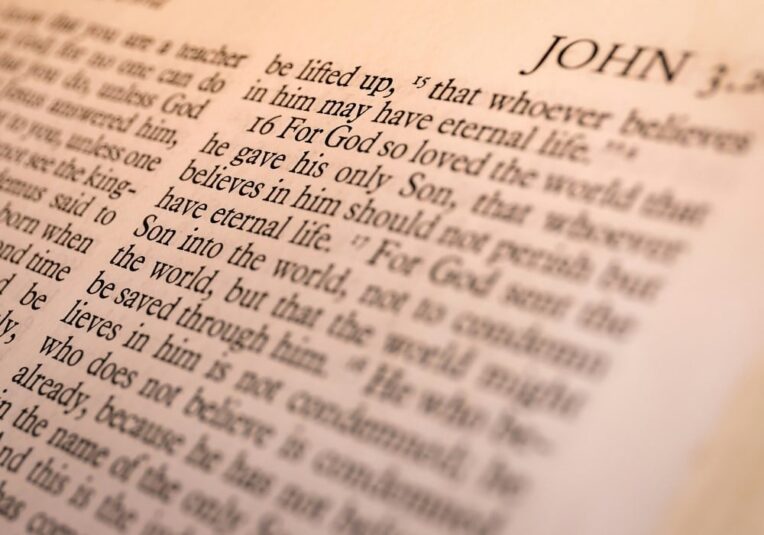
Summary:
Since I originally posted my article about the “Simple Gospel,” I’ve received a number of objections to it. “The Bible says to ‘sin no more’” was one of the more common objections: “The Bible says ‘Sin no more,’ after we get saved we must cease from our sin or lose our salvation.” In light of the context, however, this objection simply doesn’t stand up to scrutiny. The Bible uses the phrase “Sin no more” only two times. In both instances it could easily be argued that the opposite of the objection is being taught.
Let’s be clear.
Christians should strive to sin no more. But the Bible makes it clear that our sins are forgiven and we’re saved by grace. If you believe in the Son you HAVE eternal life (John 3:36). Jesus died once to pay for all our sin (Hebrews 10:12). Where sin abounds grace abounds even more (Romans 5:20). And if anyone sins we have an advocate with the Father (1 John 2:1). Below is my refutation of this objection.
The Bible Says “Sin No More”
The following is a response that I wrote to an objection I received regarding my post about “The Simple Gospel.” The objection was that there are scriptures which tell us how we are to live after we’re saved and that we “must repent of our sins and go sin no more.” There are those which teach that once we get saved, we are to refrain and repent from all sin, or risk losing our salvation. Each time we sin, they say, we must repent or else we could be sent to hell even though we’ve believed.
Another objection raised appeared to have been taken from another source using 1 Corinthians 15:31 and 2 Corinthians 4:16 to teach that we must repent daily from our sins to maintain our salvation. The goal in my response below, was to show that the scriptures mentioned don’t teach the idea that we must repent of our sin or else lose salvation, and in some cases, they actually demonstrate that God extends his mercy and grace regardless of a person’s sinful actions afterwards.
*I originally wrote this response in a hasty fashion on a Facebook comment. The italicized text below shows a quote of the original comment, and the [brackets] show where I have altered the text from my original comments on Facebook to add clarity, correct what I originally said, or change the wording to be more conducive to a blog post format.
My response:
“I wrote this post to show exactly what the gospel is. I remember being afraid of dying and going to hell when I was young, knowing that I believed in Jesus but I wasn’t perfect. No one can totally repent of all their sins, and anyone who says that they have no sin “deceives themselves and the truth is not in them. (1 John 1:8)”
Obviously, an issue of this importance should rest on what the Bible says. There are definitely a ton of scriptures telling people how they should conduct themselves after they get saved, but NONE of them point to a person losing their salvation if they don’t follow those instructions. In fact, many times they are followed by assurances that the person is still saved, but that they [should] act like it. Mistakes do happen, but willful rebellious sin still happens too. If the person has faith in Christ, then none of their behavior changes their status from saved to unsaved.
It’s worth noting that [anyone being told] to “sin no more” occurs [only] twice in the whole [Bible]: John 5:14 and John 8:11.”
“Sin no more” comes AFTER mercy is already given
“In John 8:11, a woman is accused of adultery and the people want to stone her. […] Jesus, the one without sin who has every right to cast the first stone, stays [after the others leave] and tells the woman, “Neither do I condemn thee: go, sin no more.” His response clearly shows that he recognizes her sin, yet he still shows her mercy. He gives her this command to sin no more, but in no way does he indicate that [this] mercy [he’s shown her] is at all predicated on her behavior in the past, present or future.
In John 5:14, Jesus comes to a pool where the lame and sick gather once a year to touch the water in hopes of being healed. He finds a man and asks him “Wilt thou be made whole?” The man replies by saying that he has no one to help him into the pool. Jesus heals him, and when he finds him later on says: “sin no more, lest a worse thing come unto thee.” It doesn’t [say explicitly] what the man’s sin was, but we should note that this man was attempting to heal himself using a superstitious tradition apart from God, which could easily be considered sinful in a number of ways. [Specifically, in the text, Jesus asks him if he would be “made whole,” which is often used as a euphemism for obtaining salvation.] This provides US with a great metaphor for a person who is seeking salvation (being “made whole”) by their own [efforts]. When Jesus tells the man to “sin no more,” [there isn’t anything specific to point to other than the man’s attempt to be made whole apart from God. If this is the sin Jesus is referring to, then to “sin no more” would mean that the man should not return to his seeking to be made whole apart from God.] He’s [already] been made whole, he doesn’t need to seek anymore wholeness; [if he’s been made whole, then how could he be made any MORE whole?]
When we attempt to keep our salvation by repenting of our sins, we are really admitting that Jesus’ work was not enough for us, and we are returning to the wrong way of being made whole by our own works.”
We need to take a pause:
“Sin no more” could mean “just trust Jesus”
This provides a great example for us. This man was using something other than the power of God to be “made whole,” a term which is often used to represent a picture of salvation. When Jesus comes to him, it’s clear that the man humbly recognizes his inability to do the work required on his own. Jesus makes him whole by his own power, the man doesn’t have to do anything of his own effort! There is no indication of his sinfulness before he is healed, so when Jesus says to him sin no more, lest a worse thing happen to you, the only thing we can point to specifically is his efforts to be “made whole” apart from God.
If we are trying to gain our salvation by repenting from our sins, how are we any different from this man, trying to be made whole apart from God? And if, after receiving the healing work from Christ, we return to our old efforts of trying to be “made whole” with our own works of repentance instead of trusting solely in Jesus’ work to save us, then how are we any different from this man who Jesus warned?
Jesus warned him and US that a worse thing could come unto us. A person who thinks they can lose their salvation if they sin again needs to read Hebrews 10:26 and realize that Jesus paid it all once. If that one sacrifice doesn’t forgive and atone for ALL of our sin, past, present, and future, then there remains no other sacrifice for sin. If you can gain salvation, then lose it again, that’s a HUGE problem.
Back to my response:
“What’s interesting about these two [passages] is that they actually teach the opposite of what many try to use them for. We’re told we must repent of our sins to be saved, but here, Jesus extends [life-saving] mercy to this woman despite there being zero evidence of her repentance. We are told that we must keep doing the work of repenting [from] our sins [to keep our salvation], but here, Jesus tells the man not to return to trying to make himself whole on his own.
As for the two verses shared from 1 Corinthians 15:31 and 2 Corinthians 4:16, those verses were taken completely out of context.
1 Corinthians 15 is not in any way about dying to sin or dying because of sin. It’s about how some in the church at the time denied the resurrection of Christ. Paul points out to his audience (which are saved believers) that if Christ didn’t rise from the dead then everything they do is in vain. In [verse 30], Paul asks his readers why they endure all [the persecution they do] if Christ didn’t rise from the dead. In verse 31, Paul says that he “dies daily” [in the sense that he faces deadly persecution all the time]. Just as Jesus taught, Paul takes up his cross and follows Him despite the danger [of persecution and it’s worth it BECAUSE Jesus did in fact rise from the dead].
2 Corinthians 4:16 is yet another piece of evidence that the body and spirit of the believer are treated just as I explained in this post. The outward man (the body[/flesh]) dies because of sin, but the inward man (the spirit) is renewed because of righteousness which is by faith (Romans 3:22, Romans 8:10). Our body dies because of sin, whether due to its typical ailments or due to the return of Christ ([at that time,] our body will be transformed or changed, 1 Corinthians 15:52). The body we have right now WILL NOT go to heaven, it CAN’T even if we DID completely stop sinning (1 Corinthians 15:50)”
Just to clarify:
This topic of the difference between the believer’s body and their spirit, which I describe in the main article as the “duality of the human being,” is not one which is central to the Gospel. The Gospel can be told and believed in full without it. I only chose to expound on it because it could help one to understand the result of salvation with a little more clarity. This is especially helpful to those who might get caught up on the idea that no sin will enter heaven as, for example, 1 Corinthians 6:9-10 says. Understanding the separation between the two can help explain how it’s possible that one who is born again is capable of committing sin while still being saved. When we are born again, our spirit is immediately renewed and it could be said that, in a spiritual sense, we are the children of God. But our flesh is still infected with sin, the law of sin is still “warring within [our] members (Romans 7:23).” That’s why our flesh still sins and dies even though we believe and are saved and “have everlasting life (John 3:36).” If we believe that Jesus rose from the dead, then we believe also that he will also one day raise our mortal bodies from the dead (1 Corinthians 6:14); It’s then that our bodies are saved from sin entirely.
In conclusion:
“Let me be clear, [we] believe that after a person gets saved they should try their best to abstain from all sin. But the Bible teaches that Christ offered his body once and that we are sanctified by his one sacrifice FOREVER (Hebrews 10:10-12) [and that if “anyone of us sins, we have an advocate with the Father (1 John 2:1).”] The Bible DOES NOT [teach] that a person will lose their salvation if they sin after getting saved and it DOES NOT [teach] that they will or must sin any less to keep their salvation.”
Related articles:
New












Leave a Reply